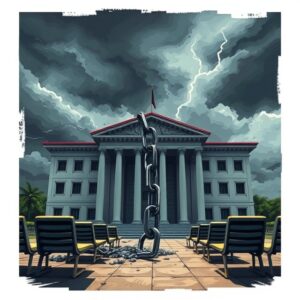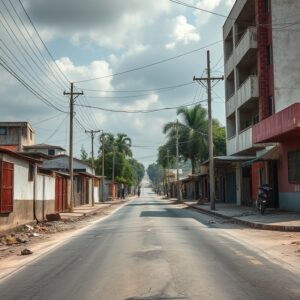The Nigerian Doctor Saving Lives in Ukraine’s War Zone

Dr. Chijioke Nwosu working tirelessly in Ukraine’s war zone
Dr. Nwosu never imagined that his career as a doctor would lead him to the heart of a war zone. He grew up in a modest home in Enugu, attended one of Nigeria’s top medical schools, and dedicated himself to serving others. Like most Nigerian doctors, he wanted to make a difference, but he never thought his path would lead to the eastern European country of Ukraine—especially during one of the most dangerous conflicts in modern history.
It began when the war in Ukraine escalated, and the international community scrambled to provide aid to the injured. Dr. Nwosu was working with a non-governmental organization (NGO) focused on humanitarian efforts when he received a phone call that would change his life forever. It was from Doctors Without Borders, a global health organization coordinating emergency relief efforts in Ukraine. They were in desperate need of skilled medical professionals to help at the frontlines.
Dr. Nwosu hesitated for days. He was well aware of the dangers of war zones and how unpredictable situations could become. But his passion for saving lives was stronger than his fears. He packed his gear and prepared for a journey that would lead him into the heart of conflict, unsure of what awaited him.
His first stop was in Lviv, a western city in Ukraine that had become a hub for refugees and humanitarian efforts. The air was cold, sharp, and unfamiliar, a stark contrast to the warmth of his hometown in Nigeria. Lviv offered a sense of calm before the chaos, but soon he would leave the relative safety of this city to step into the unknown.
Dr. Nwosu found himself working at a temporary field hospital established near the outskirts of Bakhmut. Bakhmut, a small but heavily contested area, had become a symbol of the war’s intensity. Soldiers, civilians, and injured refugees flooded the improvised clinics daily, and it was a race against time to save lives with limited resources. The days were long, the nights longer, and the pressure unyielding. Yet, the quiet moments between surgeries, when Dr. Nwosu could look at the sky and the distant horizon, gave him fleeting moments of clarity about why he was there.
One day, a young woman named Anastasia Petrova was brought into the clinic. She had been injured during a Russian artillery strike on her residential building in the nearby town of Avdiivka. Her face was smudged with dirt, her eyes wide, and her voice weak as she spoke. The ambulance had picked her up after the attack, but by the time she reached Dr. Nwosu’s clinic, the shock had set in, and her body was struggling to keep up with the severity of her injuries.
The moment Dr. Nwosu examined her, he knew the situation was grim. Anastasia had sustained fractures to her pelvis and had internal bleeding. Operating on her would be a delicate procedure, given their limited supplies and resources. Dr. Nwosu could see the fear in her eyes as she stared at him, and he knew he had to act fast.
Dr. Nwosu and his small team of volunteers labored through hours of surgery. There were no luxurious operating rooms, no highly advanced machines. Instead, it was a makeshift space with minimal equipment and hurried expertise. With the help of Ukrainian nurses and other medical volunteers, they worked tirelessly to stabilize Anastasia. Dr. Nwosu could feel the weight of each moment, knowing that each decision could either save or cost her life.
The operation was successful. Anastasia would live, but her recovery would take months, perhaps years. Despite the harsh conditions, Dr. Nwosu found solace in moments like these—when lives were saved, and hope was restored. However, he knew the war was far from over, and every new day brought fresh challenges.
Not long after, Dr. Nwosu received another unexpected case—a soldier named Vasyl, who had been injured during combat while trying to defend his town near Donetsk. Vasyl was brought in with a shattered femur and was suffering from severe blood loss. His uniform was torn, his face sunken with exhaustion. This wasn’t just another medical case; this was a man with a story—a fighter torn from his family and now laying on a makeshift surgical bed with no choice but to trust the hands working on him.
Dr. Nwosu would learn that Vasyl wasn’t just a soldier but a father, a husband, and a son. His village had been caught in the crossfire, and he had seen his neighbors suffer unimaginable losses. He recounted the moment when his community became trapped, their cries of desperation silenced by artillery and smoke. Dr. Nwosu sat by Vasyl during his recovery, listening to the story, connecting to the reality of war from personal accounts rather than distant news reports.
Over time, Dr. Nwosu started to develop an understanding of what war could do to a person—not just physically but emotionally. Each patient brought a unique story, a unique struggle. Some had lost entire families, others had fled their homes with nothing but their lives. Every case offered a new perspective. Despite the exhaustion, Dr. Nwosu would often remind himself that the human spirit could still thrive, even in unimaginable circumstances.
One day, he received a request that felt almost surreal. A group of Ukrainian children had been injured during an airstrike, and they required immediate medical attention. Dr. Nwosu had seen children wounded before—either in bombings or skirmishes—but this request tugged at his heart in a way he hadn’t experienced before. The children were brought into the clinic, their faces pale and their cries muffled by pain and fear. Dr. Nwosu could feel the weight of their suffering and knew that healing wouldn’t just be physical—it would involve rebuilding trust, hope, and a belief in safety.
One evening, as Dr. Nwosu looked out the window, he could hear distant explosions and see the faint glow of fire in the horizon. His team had grown used to these sounds, but they never became easier to ignore. The nights were colder here, the reality of war more evident, and yet Dr. Nwosu knew he would stay as long as he could—until his hands could no longer hold a scalpel or his mind gave out under the pressure.
By the time his six-month assignment came to an end, Dr. Nwosu found himself changed. He had gone into Ukraine as a healer, but he left with a deeper understanding of humanity—the will to survive, the sacrifices made by ordinary people, and the power of medicine in places where hope is scarce.
As he boarded his flight back to Nigeria, Dr. Nwosu looked at the war-torn horizon one last time. His heart was heavier than when he arrived, but it was also filled with a quiet satisfaction. He knew his journey wasn’t just about treating injuries. It was about witnessing the strength of human endurance in the face of adversity. And while he would return home to his clinic and his family, part of him would always remain in Ukraine—among the lives he touched and the stories that would live on.






